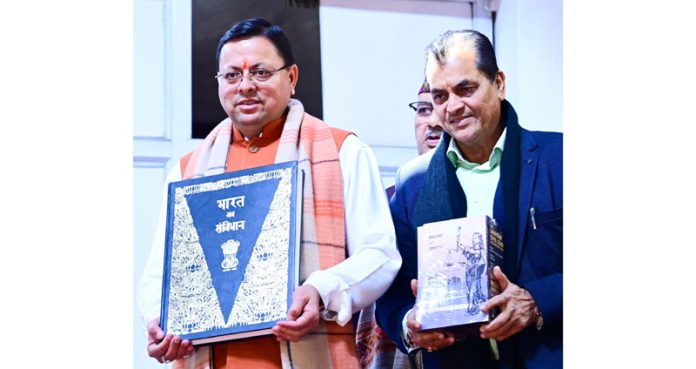Excelsior Correspondent
DEHRADUN, Feb 6: The historic Uniform Civil Code (UCC) 2024 Bill was presented in the U’khand Assembly by Chief Minister Pushkar Singh Dhami here today.
After passing this bill in the House and completing all the legal processes and formalities, U’khand will become the first state in the country to implement UCC.
The UCC recommends equal rights for men and women in all religions and sects. The state’s tribal community is exempted from the purview of the proposed law, which also mandates registration of live-in relationships.
Children born of such relation will be considered legitimate and deserted women partner entitled to maintenance from their partners.
Coming just ahead of the Lok Sabha elections, the U’khand bill ticks off an important item on the BJP agenda – a common law on marriage, divorce, land, property and inheritance for all citizens, irrespective of their religion.
The draft has been finalized after 43 public dialogue programs, 72 meetings and brainstorming with migrant Uttarakhandis. It is likely to be studied and implement by BJP Governments in states like Gujarat and Assam. Only Goa has a common civil law, in operation since the Portuguese rule.
As it sets out common provisions, the bill effectively bans practices like polygamy without specifically naming them. Marriages can be solemnised through separate rituals followed by different communities.
The bill applies to the whole of U’khand and also to people from the state who live outside.
The age of marriage in the Code has been set as 21 years for boys and 18 years for girls. In matters related to divorce, men and women have the same reasons and rights for taking divorce. Any kind of conditions have been prohibited for a woman to remarry (be it to the same old divorced person or to some other person), this will end the evil practices like Halala, Iddat.
If a case like Halala comes to light, there is a provision of 3 years’ imprisonment or a fine of Rs 1 lakh or both. If one person in a married couple changes his religion without the consent of the other person, then the other person will have full right to divorce that person and take maintenance allowance. It will be prohibited to marry again if one of the spouses is alive.
On live-in partners, it says they must not be under 18. But if any one of them is under 21, the registrar is bound to inform their parents or guardians. The bill stipulates a penalty of up to a month in prison or a fine of Rs 10,000, or both, if the partners do not submit a statement on their relationship to the registrar within a month. They will face a higher penalty if they submit false information to the registrar.
If a woman in a live-in relationship is deserted by her partner, she can approach the court for maintenance from him. There is also a provision to terminate a live-in relationship.
Trending Now
E-Paper


